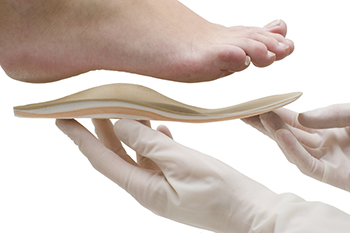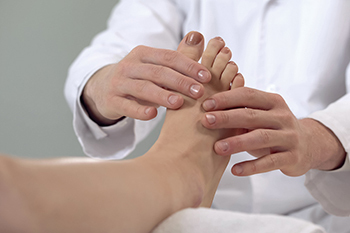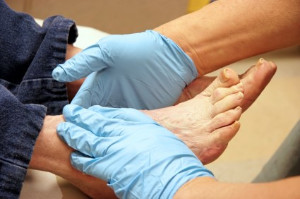Connect With Us
Blog
Items filtered by date: September 2022
Running and Orthotics

If you run, you may experience pain at times. Whether you have high or low arches, issues with your feet can impact how your feet feel after a run. If this is true for you, you may benefit from wearing orthotics. Orthotics, also known as foot orthoses, are shoe inserts used to counteract improper biomechanics of the feet during walking, running, and other activities while standing on the feet. There are over the counter (OTC) orthotics or specialized custom-made orthotics. Orthotics are generally made from soft, pliable material but some are made of more rigid materials, like plastic or graphite to keep feet firm and stable. Orthotics might help if one has flat feet to help with cushioning of the impact of the foot hitting the ground. They might also help provide heel support and relieve other injuries, such as plantar fasciitis or runner’s knee. Since orthotics work with the biomechanics of feet, they will likely help prevent future foot injuries as well. It is suggested that you consult with a podiatrist if you run and want to find out if orthotics can help keep you more comfortable.
If you are having discomfort in your feet and would like to try orthotics, contact one of our podiatrists from Omega Podiatry. Our doctors can provide the care you need to keep you pain-free and on your feet.
What Are Orthotics?
Orthotics are inserts you can place into your shoes to help with a variety of foot problems such as flat feet or foot pain. Orthotics provide relief and comfort for minor foot and heel pain but can’t correct serious biomechanical problems in your feet.
Over-the-Counter Inserts
Orthotics come in a wide variety of over-the-counter inserts that are used to treat foot pain, heel pain, and minor problems. For example, arch supports can be inserted into your shoes to help correct overarched or flat feet, while gel insoles are often used because they provide comfort and relief from foot and heel pain by alleviating pressure.
Prescription Orthotics
If over-the-counter inserts don’t work for you or if you have a more severe foot concern, it is possible to have your podiatrist prescribe custom orthotics. These high-quality inserts are designed to treat problems such as abnormal motion, plantar fasciitis, and severe forms of heel pain. They can even be used to help patients suffering from diabetes by treating foot ulcers and painful calluses and are usually molded to your feet individually, which allows them to provide full support and comfort.
If you are experiencing minor to severe foot or heel pain, it’s recommended to speak with your podiatrist about the possibilities of using orthotics. A podiatrist can determine which type of orthotic is right for you and allow you to take the first steps towards being pain-free.
If you have any questions please contact our offices located in Los Angeles, Huntington Park, and Reseda, CA . We offer the newest diagnostic and treatment technologies for all your foot and ankle needs.
Wounds That Don't Heal Need to Be Checked
Places to Wear Flip Flops

Flip-flops are a popular type of shoes that are worn during the summer months. They can be purchased in a variety of colors and styles, and are easy to wear. They are generally inexpensive to buy and can be fun to wear. Despite the appeal, these types of shoes may not be beneficial for the health of the feet. Flip-flops often have little or no arch support and the entire foot can be negatively affected. The toes often grip harder than they should to keep the shoes on the feet. They are appropriate to wear for short periods such as in public showers or locker rooms, and to the beach. When other activities are performed, it is suggested that sturdier shoes are worn that can better protect the feet. For more information about how the feet can be affected by wearing flip-flops, please consult with a podiatrist.
Flip-flops can cause a lot of problems for your feet. If you have any concerns about your feet or ankles, contact one of our podiatrists from Omega Podiatry. Our doctors will assist you with all of your foot and ankle needs.
Flip-Flops and Feet
Flip-flops have managed to become a summer essential for a lot of people. While the shoes may be stylish and easy to slip on and off, they can be dangerous to those who wear them too often. These shoes might protect you from fungal infections such as athlete’s foot, but they can also give you foot pain and sprained ankles if you trip while wearing them.
When Are They Okay to Wear?
Flip-flops should only be worn for very short periods of time. They can help protect your feet in places that are crawling with fungi, such as gym locker rooms. Athlete’s foot and plantar warts are two common fungi that flip-flops may help protect your feet against.
Why Are They Bad for My Feet?
These shoes do not offer any arch support, so they are not ideal for everyday use. They also do not provide shock absorption or heel cushioning which can be problematic for your feet. Additionally, you may suffer from glass cuts, puncture wounds, and stubbed toes since they offer little protection for your feet.
More Reasons Why They Are Bad for Your Feet
- They Slow You Down
- May Cause Blisters and Calluses
- Expose Your Feet to Bacteria
If you have any questions, please feel free to contact our offices located in Los Angeles, Huntington Park, and Reseda, CA . We offer the newest diagnostic and treatment technologies for all your foot care needs.
Obesity and Foot Swelling

Having swollen feet is certainly not a pleasant experience. Swelling in the feet occurs when bodily fluids become trapped or built-up in the tissues. As a result, the affected area can become significantly puffy, causing them to look markedly bigger than usual. Although swelling in the feet has a litany of different causes, obesity is one potential contributing factor to swollen feet. When an individual is obese, or overweight, they can sometimes experience reduced blood circulation, which then can make the feet become swollen. Additionally, since obese people carry more weight, they consequently exert more pressure on their feet and this can cause pain when walking. As a result, obese people may minimize their physical activity, which can make fluids become trapped in the feet. If you are an individual that struggles with obesity, please schedule an appointment with a podiatrist to discuss ways to mitigate your foot pain. In consultation with your podiatrist, you may discuss whether or not losing weight would help you reduce the problems that you are experiencing in your feet. Do not take any chances with the health of your feet–contact a podiatrist today.
Obesity has become very problematic at this point in time and can have extremely negative effects on the feet. If you’re an obese individual and are concerned about your feet, contact one of our podiatrists from Omega Podiatry. Our doctors can provide the care you need to keep you pain-free and on your feet.
Obesity and Your Feet
Since your feet are what support your entire weight when standing, any additional weight can result in pain and swelling. Being overweight is one of the main contributors to foot complications.
Problems & Complications
Extra Weight – Even putting on just a few extra pounds could create serious complications for your feet. As your weight increases, your balance and body will shift, creating new stresses on your feet. This uneven weight distribution can cause pain, even while doing the simplest tasks, such as walking.
Diabetes – People who are overweight are at serious risk of developing type-2 diabetes, which has a drastic impact on the health of your feet. As you get older, your diabetes might worsen, which could lead to loss of feeling in your feet, sores, and bruises. You could also become more prone to various infections.
Plantar fasciitis – Pressure and stress that is placed on muscles, joints, and tendons can trigger plantar fasciitis, which is an inflammation of tissue that forms along the bottom of the foot.
If you have any questions please feel free to contact our offices located in Los Angeles, Huntington Park, and Reseda, CA . We offer the newest diagnostic and treatment technologies for all your foot and ankle needs.
Shared Symptoms of Diabetes Type 1 and Diabetes Type 2

Both Type 1 Diabetes and Type 2 Diabetes can produce long-term complications due to increased levels of glucose (sugar) in the blood. They also share several similar symptoms. For instance, when your body struggles to expel excess amounts of sugar from your blood, you may urinate frequently or get excessively thirsty. Diabetes can also make it difficult for cells to absorb glucose in the blood and convert it into energy, causing you to feel fatigued and weak. A decrease in fluids may cause dry mouth and itchy skin, and disruptions in insulin production or use can affect your ability to get energy from food—making you lose weight unexpectedly or be hungrier than usual. Your feet are often the first area to exhibit signs of diabetes. High glucose levels in the blood can cause nerve damage in the feet, which can result in numbness, burning, tingling, or swelling. This can make it difficult for you to feel when you have a cut or bruise on your feet. Poor circulation associated with diabetes can exacerbate this problem by decreasing the body’s ability to heal any such injury, and wounds may develop. This can be problematic in people with diabetes and may lead to far more serious complications if it is not managed and treated properly. That is why a podiatrist is a critical part of your health team should you be diagnosed with diabetes.
Diabetic foot care is important in preventing foot ailments such as ulcers. If you are suffering from diabetes or have any other concerns about your feet, contact one of our podiatrists from Omega Podiatry. Our doctors can provide the care you need to keep you pain-free and on your feet.
Diabetic Foot Care
Diabetes affects millions of people every year. The condition can damage blood vessels in many parts of the body, especially the feet. Because of this, taking care of your feet is essential if you have diabetes, and having a podiatrist help monitor your foot health is highly recommended.
The Importance of Caring for Your Feet
- Routinely inspect your feet for bruises or sores.
- Wear socks that fit your feet comfortably.
- Wear comfortable shoes that provide adequate support.
Patients with diabetes should have their doctor monitor their blood levels, as blood sugar levels play such a huge role in diabetic care. Monitoring these levels on a regular basis is highly advised.
It is always best to inform your healthcare professional of any concerns you may have regarding your feet, especially for diabetic patients. Early treatment and routine foot examinations are keys to maintaining proper health, especially because severe complications can arise if proper treatment is not applied.
If you have any questions please feel free to contact our offices located in Los Angeles, Huntington Park, and Reseda, CA . We offer the newest diagnostic and treatment technologies for all your foot and ankle needs.

